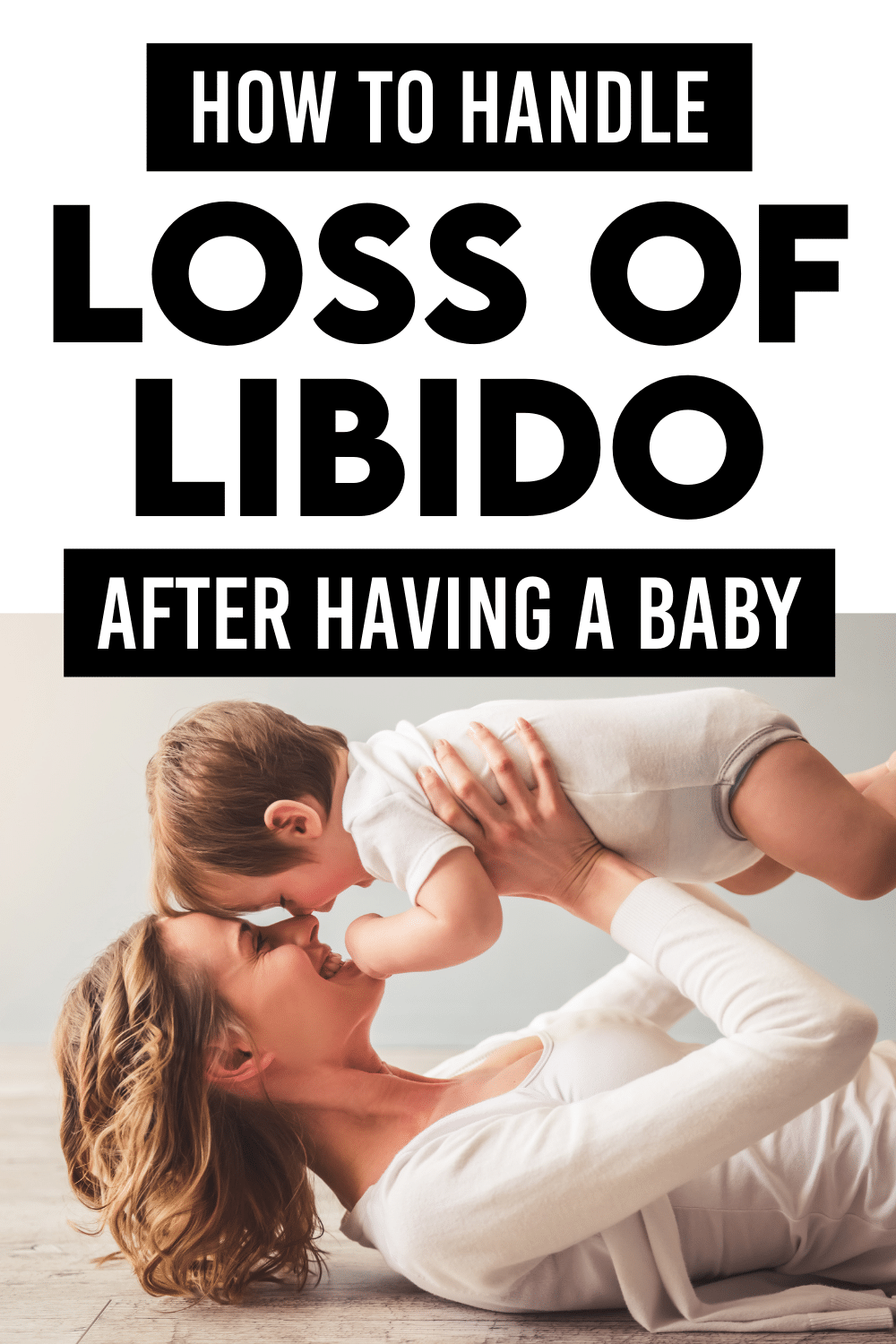How to Handle Low Sex Drive in Women Postpartum
After nine long months of growing your future BFF and going through (what I can imagine was) intense labor and delivery, you have accomplished quite a lot, mama! So, start by giving yourself a round of applause for being the Super Woman that you are!
Of course, trying to heal while also caring for your newborn is a full-time job, and balancing this new title of “Mom” might include temporarily putting some other things on the back burner…like postpartum SEX! While some women are okay with this, you might find yourself wondering, “Why don’t I want sex anymore? Is low sex drive in women normal post-baby? What’s wrong with me?” *Sigh*.
For starters, there’s nothing wrong with you! It is common to experience a decreased sex drive after having a baby. One study involving postpartum women showed that 20% had little to no desire for sex after birth, and another 21% had a complete loss of desire for sexual activities (McKain).
The good news is; however, most women report that this loss of sex drive is temporary. With time, patience, and some natural libido-boosting tips, you and your spouse can build a healthy and happy sex life again!

Disclaimer: This post contains affiliate links. To learn more about ’em, click here.
Table of Contents
Why We Experience a Dip in Libido After Having a Baby
Hmm, let’s see, well, your life has just been turned upside down with the responsibility of caring for this tiny human! New moms are adjusting to their new role as mothers, spending their days wiping bottoms, feeding, and washing clothes soaked in spit-up. So it’s no wonder that there doesn’t seem to be a “sexy” vibe in the air at home!
When it comes down to the question of, “WHY am I feeling so NOT interested in sex?” you’ll be pleased to know that several factors contribute to these feelings.
- Hormones: The biggest cause of low sex drive in women is the massive dive our hormone levels take post-childbirth! Postpartum hormones are designed to make you lust-less. During this post-baby time, your hormones are hard at work focusing on healing and producing milk. Unfortunately, immediately after birth, your hormone levels dip into the menopausal range for a few weeks, which in turn causes significantly low libido (Mugisha, 2020).
- Fatigue: It’s no secret that new babies are demanding! They require emotional and physical attention 24/7. This round-the-clock care can be overwhelming and incredibly draining, both physically and mentally. As a result, when you do have a moment for yourself, you may feel “touched-out” for the day and crave some time to be alone while taking a break from all things physical.
- Less natural lubrication: In the first four to six weeks after childbirth, you are more likely to have less natural lubrication due to your body’s decreased hormone levels (Marple, 2021).
- You may feel less attractive: It is not uncommon to feel less attractive or self-conscious over your ever-changing body. This fact combined with spit-up-stained clothes and leaking breasts (if you’re breastfeeding), may not make you feel the sexiest.
- You may fear becoming pregnant: Evolution has a role in this one! In nature, female animals rarely mate when they are caring for their young because their bodies would not be able to handle a subsequent pregnancy. This may be partially true for us women as well (McKain).
- Your body is healing: You are still healing from your labor and delivery, mama! You may also be experiencing soreness or discomfort that makes sex after birth (or the thought of sex) painful (McKain).
- Breastfeeding: Nursing mamas not only experience a dip in estrogen, but they also produce a hormone, prolactin, which stimulates milk production. The downside? It severely dampens your libido (Pallarito, 2021).
- Bonding & skin-to-skin with your baby: Oxytocin is the love hormone released when you hug, kiss, have sex, etc. Before giving birth, the physical contact you made with your spouse triggered the release of this hormone so you could bond with one another. After childbirth, all the snuggling, breastfeeding, and skin-to-skin contact mothers have with their child causes them to “get their fix of oxytocin from their baby.” This energy transfer is thought to significantly decrease sexual desire (Gambelin, 2021).

Let’s Get Those Hormone Levels Checked
Before we dive into some natural libido-boosting tips, it would be in your best interest to make an appointment with a healthcare provider so they can check your hormone levels. Physical causes, such as hormonal imbalance, might be the underlying cause of this loss in libido!
Furthermore, if you are experiencing lingering pain or other postpartum complications, don’t hesitate to make an appointment with your healthcare provider to chat about things!

Natural Ways to Increase Sex Drive Post Baby
First things first, don’t rush things! It took you nine months to grow your beautiful baby, so allow yourself the same amount of time for your body to heal and return back to normal. Then, when you are ready to be intimate again, remember, the goal isn’t to get back to the “old you”; it’s to figure out who you are now!
Now let’s talk about specific ways you can try to increase your sex drive naturally.
- Exercise and weight lifting: Exercise is a great way to boost overall health, testosterone levels and in turn, sex drive (Mawer, 2016). We personally recommend a workout program called the Mommy Tummy Fix that was created by a physical therapist. It is specifically designed for women who have had the blessing of carrying a child, but that blessing left their body in a different state than it was before. This program walks you through the WHY behind your changing body, and gives specific advice for how to workout the RIGHT way in order to help your body continue to heal! I love it because it’s simple, which means that it’s a lot more sustainable and easy to stick with. (Unlike other programs that you start and then quit after 1 week.) If you’re interested in trying it out, use the code MOMMY30 to save $30 on the program!
- Your diet: What you eat has a huge impact on your hormones, particularly testosterone. Eating enough protein, fat, and carbs will help maintain happy hormone levels (Mawer, 2016).
- Manage your stress: Much research has highlighted the dangers of long-term stress, and this goes for your hormone levels as well! For optimal hormone health, try to find ways to manage your stress and anxiety (Mawer, 2061).
- Get REAL sunlight: True Vitamin D has been linked to being a fantastic testosterone booster! Try to get regular exposure to sunlight every day (Mawer, 2016).
- Get plenty of sleep: Getting enough restful sleep is just as important to your health as diet and exercise is, and it also impacts your hormone levels! While some individuals can survive on less sleep, aim for a minimum of 7 hours per night (Mawer, 2016).
- Take natural testosterone boosters: A few natural testosterone boosters have been supported by research studies. Things like ginger extract, horny goat weed (yes, that is the real name), and an herb called ashwagandha may be able to boost those hormone levels (Mawer, 2016).
- Avoid hormone-disruptors: High-exposure to endocrine disrupting chemicals may also affect your hormone levels. Try to minimize your exposure to parabens, synthetic fragrances, and BPA (Mawer, 2016).
- Make sex a priority: Intimacy with your spouse needs to be a priority! It should be something that you literally put on your to-do-list. If it helps, throw it onto your calendar or schedule a night for some lovin’!
- Regain your sexual self-esteem: If you are feeling less than desirable these days, ask yourself, “What will it take for me to feel sexy right now?” This may include going for a spa day, treating yourself to a haircut or manicure, buying some new clothes or picking out some lingerie. Find ways to help yourself feel more sexy!
- Ask your partner for some “choreplay”: Many moms become the manager of all things home and baby once they become mothers. When moms are always busy with the household chores and tasks, they become exhausted and stressed by the end of the day. If their spouse can participate in some “choreplay” by taking some tasks off of their to-to lists, this will free up a lot of time and energy for more intimate activities (Kerner).
- Touch each other: Remember earlier when I mentioned how oxytocin is released upon physical contact? Well, to get back on track, start touching each other! Don’t forget, you don’t have to have sex to be intimate. Set aside time to kiss, cuddle, hold hands, offer massages–whatever feels right (Sloan).
- Sex begets sex: If you want your desire for sex after pregnancy to improve, try to commit to having sex more often! Having sex raises your testosterone level and will help you get back into the swing of things (Kerner).
- Reconnect as a couple: Is it possible for you to sneak off with your spouse for a date night? A romantic night out might be just what you need! Even if you can only sneak away for a quick walk or a drive-through ice cream date, this quality time might help rekindle your physical relationship!

The bottom line is, if you don’t feel up for resuming your normal sex life right away, give yourself some grace! Both you and your partner need time to adjust to caring for your brand new baby, both physically and mentally! Remember that there is no need to rush in between the sheets before you both feel ready. But don’t worry, in time, postpartum sex can be just as satisfying (sometimes, even more, 😉) as sex was pre-baby. You will get there!
Sources:
Gambelin, A. (2021, July 22). Mother.ly. “It’s science: This is why many postpartum moms don’t feel like having sex.”
Kerner, I. Babycenter. “What’s the best way to get my sex drive back after having a baby?”.
Marple, K. (2021, February 8). Babycenter. “Let’s talk about sex: After the baby.”
Mawer, R. (2016, May 20). Healthline. “8 Proven Ways to Increase Testosterone Levels Naturally”.
McKain, L. J. Babycenter. “Is it normal not to want sex after having a baby?”.
Mugisha, E. (2020, August 25). MamaMend. “What to do about a low sex drive after childbirth.”
Pallarito, K. (2021, September 20). What To Expect. “Low Libido Postpartum.”
Sloan, C. WebMD. “Get Your Sex Life Back After Baby.”




These are such good ideas. The postpartum period is such a sweet special time but can definitely make it hard in the sex department. Thanks for these tips!
I just love the way you approached this topic! Thank you for providing so much good information so sensitively!
Great article!
Yes to all of this! I experienced this for the first timebagter my 5th child. Definitely something new. Thank you for this!
This was SO well written! I love that you touched on some of the culprits that aren’t talked about as often. My hormones stayed in the “menopausal” range for almost a year before anyone was willing to admit that maybe what I was experiencing fell outside “normal” post partum changes. If I had thrown out the word menopause I think people might have listened better but I had no clue!